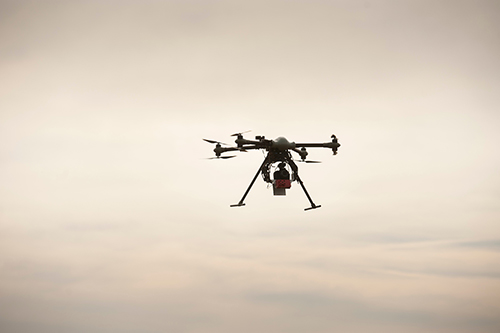FAA announces $3.3 million in grants for Mississippi State-led ASSURE coalition researching drone use during emergencies
Contact: Allison Matthews

STARKVILLE, Miss.—A Mississippi State-led alliance with the goal of continuing the safe and successful integration of drones into the nation’s airspace is gaining $3.3 million in grants from the Federal Aviation Administration.
Mississippi State is the lead university for the FAA’s Center of Excellence for Unmanned Aircraft Systems (UAS), also known as the Alliance for System Safety of UAS through Research Excellence, or ASSURE. The coalition includes 25 renowned research universities and more than 100 additional government and industry partners.
Additionally, MSU’s Raspet Flight Research Laboratory recently was designated as the FAA’s UAS Safety Research Facility, placing the research center at the helm of studying and developing safety and certification standards as UAS become increasingly integrated in the U.S. airspace.
U.S. Transportation Secretary Elaine L. Chao said during a recent announcement of the research, education and training grants that these funds “will help develop a greater array of innovative strategies to more effectively deploy drones during emergency response situations.”
Mississippi State is receiving a nearly $1.3 million grant to provide overall program management, which includes tracking of financial information for all core ASSURE university project activities; reviewing and vetting all project-related documentation prior to submission to the FAA; hosting and facilitating all FAA-required meetings; and outreach to government, industry and academia.
“Mississippi State is extremely proud to be leading an amazing group of researchers from across the U.S. and around the world, safely integrating this exciting new technology into our everyday lives,” said ASSURE Executive Director Steve “Lux” Luxion. “Unmanned aircraft hold so much potential to improve public safety, increase commercial opportunities, and enhance quality of life.”
MSU also is receiving an additional $130,000 as part of disaster preparedness and response research looking at how UAS can aid during times of various natural and human-made disasters.
The research will focus on procedures to coordinate with the Department of Interior, Department of Homeland Security, Federal Emergency Management Agency and other federal, local and state organizations. The University of Alabama-Huntsville is providing leadership for this research component, and other ASSURE institutions receiving funds include the University of Alaska and New Mexico State, North Carolina State and Oregon State universities.
ASSURE research already has provided pivotal knowledge and results on such topics as UAS collision severity, detect-and-avoid requirements for beyond visual line of sight UAS operations, UAS certification standards and considerations, and UAS noise measurement studies.
Learn more about UAS research at MSU at www.weringtrue.msstate.edu/uas/index.html. More about MSU’s Raspet Flight Research Laboratory and ASSURE is online at www.raspet.msstate.edu/research/faa-assure.
MSU is Mississippi’s leading university, available online at www.msstate.edu.